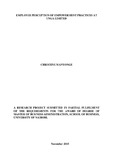| dc.description.abstract | Empowerment is a dynamic process that focuses on linking competencies and employee
strength towards being proactive in a social dynamic and subsequent change. Its practices are
manifested through levels of employees’ involvement in decision making, levels of work
related participation, effective communication, continuous employee training and
development, favorable organizational culture, well laid incentive systems, trust among
employees, clarity of roles and expectations, sufficient information about work and
teamwork. The objective developed for this study was to determine employee perception of
empowerment practices. The study was descriptive survey design whereby data was collected
by use of semi structured questionnaires. The study was undertaken within Uasin Gishu and
Nairobi Counties where the focus were the permanent employees of Unga Limited at
Headquarters office, Nairobi and Eldoret branch. The sample size of the study was 46
permanent employees of Unga Limited selected through stratified and random sampling,
however only 40 employees participated, hence response rate of 87%. The data from the
study was analyzed using descriptive statistics and inferential statistics whereby frequencies,
percentages weighted means and average weighted means were used to weigh employees’
perception of empowerment practices. The findings revealed that employees have a positive
perception towards empowerment practices as weighted means to all statements were above
2.5. It emerged that Unga Limited has its Vision and goals clearly spelt which had the highest
weight of 3.95, followed by employees’ participation in decision making and company
having pro-empowerment policy and structures in place, both coming second with a mean
weight of 3.875 each. However, managers mentoring lower cadres had the least mean weight
score of 2.55. The main limitation in undertaking the study was failure to get 100% response,
and getting the respondents return back the questionnaires on time. From the findings, there is
need for Unga to have some reforms on its management through encouraging formal
mentorship programs of lower cadres spearheaded by management, management to enhance
positive attitudes, commitments and involvement of employees in work related matters,
delegate duties more and avail sufficient resources needed in execution of tasks. Given that
this study used structured and semi structured as the only data collection tool, suggestion is
made for future researches using other tools. Future research could also focus on perception
of employee empowerment practices in other industries and service organizations using
similar variables to identify if employee perceptions are similar or differ from one industry to
another. | en_US |

